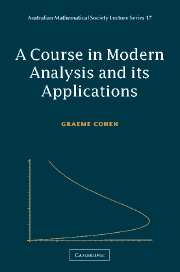8 - Inner Product Spaces
Published online by Cambridge University Press: 06 July 2010
Summary
Definitions; simple consequences
We introduced normed spaces with a discussion on the desirability of being able to add together the elements of a metric space. For that reason we began working with vector spaces rather than arbitrary sets. The same argument as in the earlier discussion could apply to the desirability of being able to multiply together the elements of a metric space, and it is not necessary to repeat it here.
There are various ways of defining a product, each way serving its own end and yet each generalising the notion of the product of real numbers. One way is to suppose that the underlying set of all we have developed so far is no longer a vector space only but also has the properties of a ring or a field in which multiplication of elements is already defined. This line can be developed into the theory of Banach algebras.
What we do here requires no such basic structural alteration: we will continue to work in a vector space and will say that a product is defined whenever we have a function of pairs of elements of the space that satisfies four axioms or requirements to be listed below. Specifically, this is called an inner product, and may be viewed more easily as a generalisation of the familiar scalar product of ordinary three-dimensional vectors. The common definition of the scalar product of two vectors uses the angle between the vectors. Working in reverse, we can use the inner product to define the angle between elements of quite arbitrary vector spaces. Except in one important instance, this does not generally give rise to any useful interpretations.
- Type
- Chapter
- Information
- A Course in Modern Analysis and its Applications , pp. 251 - 280Publisher: Cambridge University PressPrint publication year: 2003

